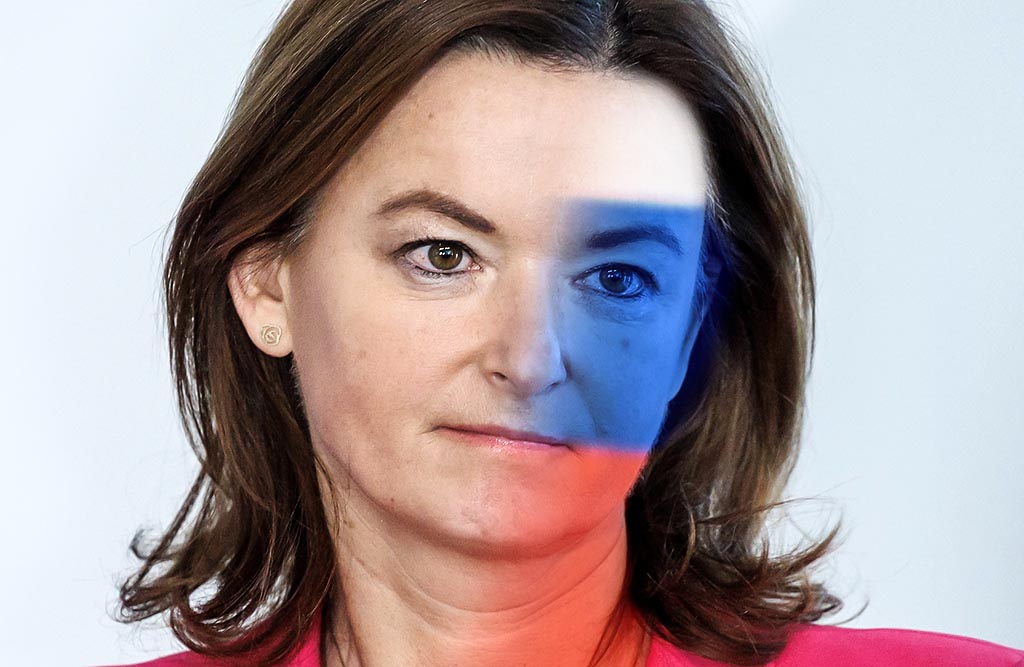By: Gal Kovač (Nova24tv)
On Tuesday, the Slovenian Democratic Party (Slovenska demokratska stranka – SDS) presented a motion for a resolution which places Russia on the list of state sponsors of international terrorism, which is similar to the resolution that has already been adopted by the European Parliament. The motion for a resolution will once again test the commitment of the Slovenian political left to European values, similarly to the resolution on European Conscience and Totalitarianism, which has not yet been voted on by the National Assembly, which has only taken it into consideration for now. The duplicity of the left, which presents itself as the guardian of the values of the totalitarian revolution at home and as progressive, Western-oriented abroad, is perhaps best embodied by the Foreign Minister of Slovenia from the ranks of the Social Democrats party (Socialni demokrati – SD).
“I do not believe that this can stop Vladimir Putin from this aggression, that this will stop the war – on the contrary, it is adding fuel to the fire,” Tanja Fajon said yesterday in response to the SDS party proposal. And practically at the same time, the Foreign Ministry announced that the Minister of Foreign Affairs would express solidarity with Ukraine at the UN General Assembly’s Emergency Special Session. How can we explain this dual policy, reflected on the one hand by declaratory support for the attacked people and, on the other, by a much more timid implementation of actual policies?
The Slovenian left has long had an ambiguous attitude towards “Europeanness” and the values that this identity embodies. In the past, this has probably been expressed most clearly in the repeated rejection of the European Parliament’s resolution on European Consciousness and Totalitarianism. This went furthest during the previous government’s term when the resolution had passed through the first sieve – the Committee on Justice. However, the unequivocal condemnation of all totalitarianisms – Nazism, communism and fascism, did not get enough votes to be adopted afterwards. In the current term of office of the government of Robert Golob, the same resolution has not even made it past the parliamentary committee. As things stand at present, the National Assembly has only taken the resolution into consideration.
Then came the illegal Russian invasion of Ukraine, which further exposed the attitude of the Slovenian left towards “unresolved history” and covert alliances. Beyond the public words of support, there has been a series of votes in the European Parliament, public statements and decisions, which clearly show that Slovenian foreign policy, under the leadership of Tanja Fajon, is acting very differently from what it says.
The MEPs “NO” for Ukraine
When Tanja Fajon was still an MEP, in one of her last votes, she voted in favour of postponing the European Union’s accession negotiations with Ukraine. When Ukraine did win the EU candidate status, the Foreign Minister wrote: “I am delighted that Ukraine’s dream of an EU future is coming true. Congratulations also to Moldova and Georgia for receiving confirmation from the European Commission that they are on the right track. I also fully support the Western Balkan countries’ early progress on the EU path.” The Foreign Minister tried to justify her vote by saying that she supported the resolution and that she only voted against an accelerated start of accession negotiations.
She opposed Janša’s visit to Kyiv
The former Prime Minister was among the first statesmen to travel to Kyiv in solidarity with Ukraine after the start of the war. Fajon vehemently opposed the visit, arguing that it sent the wrong signal and even that the former Prime Minister was somehow an ally of Vladimir Putin. The fact that it was the right signal was last confirmed a few days ago by the President of the USA, Joe Biden, and before him, by a number of other European leaders.
The Slovenian public, however, did not need foreign statesmen to confirm that Fiala, Janša and Morawiecki were, in fact, at the very vanguard of world politics. This was even confirmed by the Minister herself when she went to Kyiv shortly after her appointment.
Later, a series of her statements could be interpreted as unequivocal support for Ukraine. These are freely available online. But in the meantime, and behind the scenes of public appearances, processes have been taking place in Slovenia, which shows that, on the contrary, the relationship between Slovenia and Russia is almost intact. Slovenia’s exports to Russia have exploded since the start of the war in Ukraine. We became European champions in export growth.
In recent weeks, mixed signals have also been added to the words of support. At the 26th Slovenian Diplomatic Consultation, the Minister said that “Russia must be part of the debate on a new security architecture in Europe.” The statement was almost immediately picked up by the Russian state media.

